| | | | Policy BriefSeptember 2022 | |
| | | | Mask obligation on boardGermany’s unjustifiable special pathOn August 24, the German government presented its draft for the revised Infection Protection Act (IfSG). According to the draft law, the mandatory mask requirement on airplanes is not only to be continued, but tightened. This would cement Germany’s special path – without any plausible reason. The Bundestag and Bundesrat must urgently ensure improvements in the further legislative process. | |
| | | | High efficiency (HEPA) filters ensure clean cabin air
Every 2 to 3 minutes all the air in the cabin is renewed 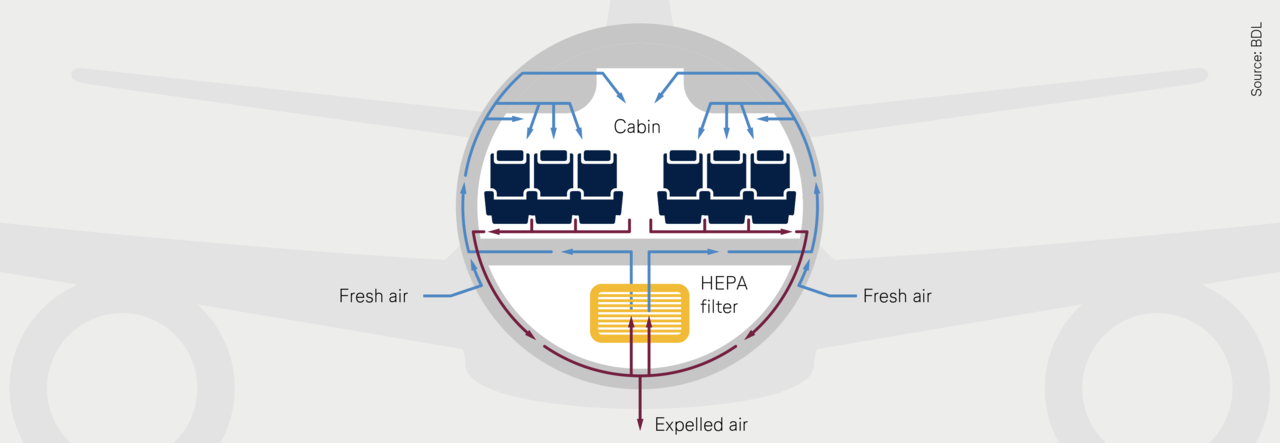
| |
| | | | Under the federal government’s plans, passengers on board aircraft taking off or landing in Germany will still have to wear masks. However, only FFP2 masks are to be permitted in the future. Previously, travelers could also use surgical masks. This means a significant tightening. Special regulation not justifiable
Whether in the subway, on the bus, in clubs or concert halls – the German government has decided against a uniform regulation on the wearing of masks. Only in airplanes and on long-distance rail services is a special regulation to apply. There is no scientific justification for this. On the contrary, the Robert Koch Institute (RKI) sees no increased risk of infection on board aircraft. The EU air safety and health authorities EASA and ECDC have been waiving mandatory mask requirements since May - and the vast majority of countries are acting accordingly. International isolation – a misguided development
Our neighboring countries, Great Britain, the USA: they have all long since dropped the requirement to wear masks on board. The list goes on and on. For German airlines, this results in a massive competitive disadvantage. Passengers who have the choice of flying for several hours with or without a mask usually opt for the more comfortable option. It is true that the mask requirement formally applies to all airlines flying to or from Germany. However, it is not a secret that airlines from countries where masks are not mandatory hardly apply the regulation at all. Travelers’ understanding wanes
The German mask requirement has long since lost the acceptance of many passengers and leads to conflicts at the expense of employees. This applies all the more to a German go-it-alone in favor of the FFP2 mask. We must now focus on personal responsibility and voluntary action. In airplanes, the air is cleaned by high-efficiency filters (HEPA). In this respect, it is difficult to understand why stricter rules should apply here than in other areas of life. Good policy is reasonable and does not neglect the comprehensibility of legal requirements. The IfSG draft fundamentally contradicts these premises: compliance with mandatory masks provokes resistance among air travelers and places a considerable burden on our crews. A mandatory FFP2 mask would further increase the competitive disadvantage for domestic airlines. A revision is urgently needed. | |
| | | | Clean cabin air
„The risk of infection is extremely low. This is also related to the air filtration systems in airplanes, which are exorbitantly better than in all other modes of transport. They filter out more than 99 percent of germs.“ René Gottschalk, Head of the Frankfurt Health Department | |
| | | | EU Climate PolicyWill policymakers finally walk the talk?For more than a year, Brussels has been negotiating the “Fit for 55” package. In terms of aviation, concepts for fair competition with non-European competitors and against carbon leakage are still missing. The upcoming trilogue negotiations will show how serious European and German politicians are about not disadvantaging domestic airlines and risking jobs.When she presented the European Green Deal in December 2019, the president of the European Commission Ursula von der Leyen said: “The European Green Deal is on the one hand about cutting emissions, but on the other hand it is about creating jobs and boosting innovation.” She added that this project “is very ambitious, but it will also be very careful in assessing the impact and every single step we are taking.” As far as aviation and the “Fit for 55” package are concerned, reality is far from the claims made by the president of the European Commission. In particular, adequate solutions to carbon leakage and distortion of competition are still missing. Similarly, on a national level, the German coalition agreement states: “Our goal is to create a fair framework in international competition for effective climate protection in air transport”. This announcement is correct. But it must lead to tangible policy. If the German government and other EU member states want to live up to self-imposed claims, they have to get the “Fit for 55” plans for air transport corrected. The current proposals would create massive competitive disadvantages for European network airlines and hubs. Airlines and hubs on the Bosporus and Persian Gulf
would benefit. Two dossiers in particular need to be improved: “ReFuelEU Aviation” to introduce a blending mandate for sustainable aviation fuels (SAF) and the reform of the Emissions Trading Scheme (ETS). | |
| | | | “Fit for 55” results in a significant burden on Europe’s hubs
Development of air ticket prices via individual hubs 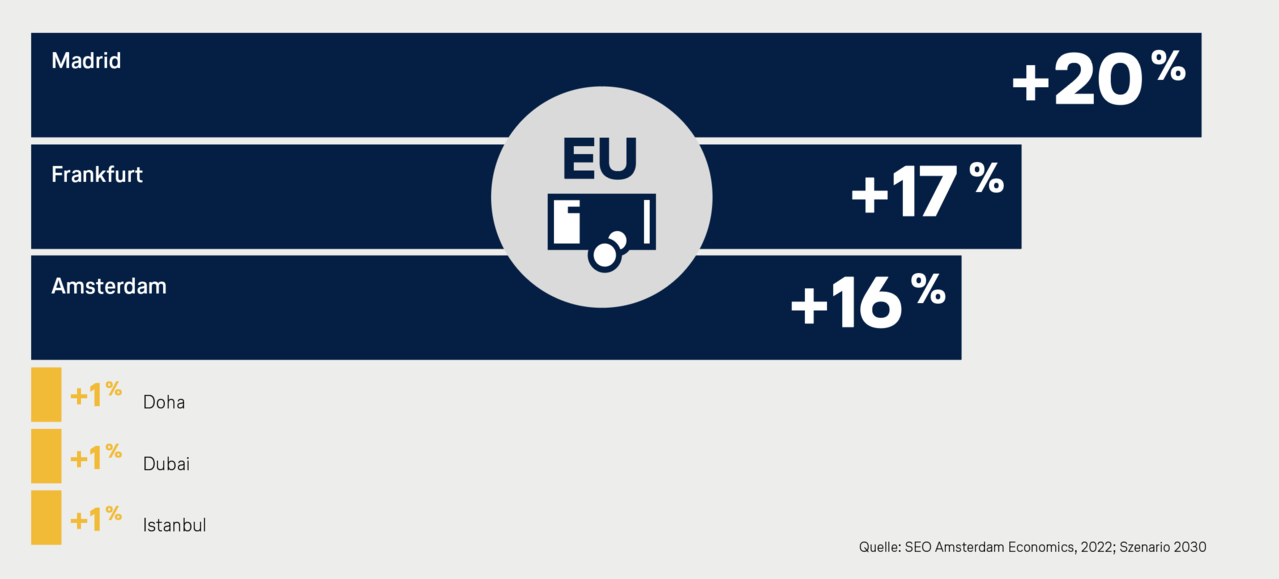
| |
| | | | SAF mandate unilaterally burdens European aviation
A SAF mandate can boost demand and thus the so far low production of green kerosene. However, fuel costs rise considerably due to the significantly more expensive SAF. For the greatest possible climate protection effect and balanced competition, the mandate must be redesigned: It should not unilaterally affect EU airlines, but also take adequate account of non-EU carriers. However, the planned SAF mandate should only apply to departures from the EU. This would make flight connections via European hubs significantly more expensive. The ticket price increase for journeys via Istanbul or Dubai, on the other hand, would be marginal because no SAF costs would be incurred when transferring at these hubs. This imbalance must be corrected. Implement ETS reform in a competition-neutral way
In principle, the ETS is an effective climate protection instrument because it prices, limits, and reduces CO2. However, as it only applies to flights within the EU, it is a disadvantage for European network airlines and airports in intercontinental transfer traffic. This is because feeder flights via EU hubs are subject to the ETS, whereas transfer connections via non-European hubs are not. Thus, the ETS reform should include an urgently needed correction of this distortion of competition. Instead, the European Parliament is even arguing for a tightening by extending the ETS scope to all departures in the EU. This would mean that EU airlines would buy ETS allowances for the entire journey, i.e. for the short feeder flight within the EU and the long-haul. In contrast, airlines with a transfer flight via a non-EU hub (e.g. Istanbul, Doha, Dubai) save themselves the purchase of allowances for the long and particularly expensive part of
the route. Already without the extension of the scope, transfer traffic will be heavily shifted to non-EU hubs. Consequently, 130,000 to 260,000 jobs would be at risk, as a recently presented study shows (SEO Amsterdam Economics: Aviation “Fit for 55” – Ticket prices, demand and carbon leakage, March 2022). With an extension to all departures in the EU, the effects would be further exacerbated. | |
| | | | Development of passenger flows as a result of “Fit for 55”
Example Hamburg - Bangkok in 2035: The “Fit for 55” program increases ticket prices via Frankfurt by around 100 euros. Transferring in Istanbul, the “Fit for 55” additional costs amount to only one fifth. Overall, demand at EU hubs is expected to decline by 15 percent, while demand via non-EU hubs will grow by more than 24 percent. 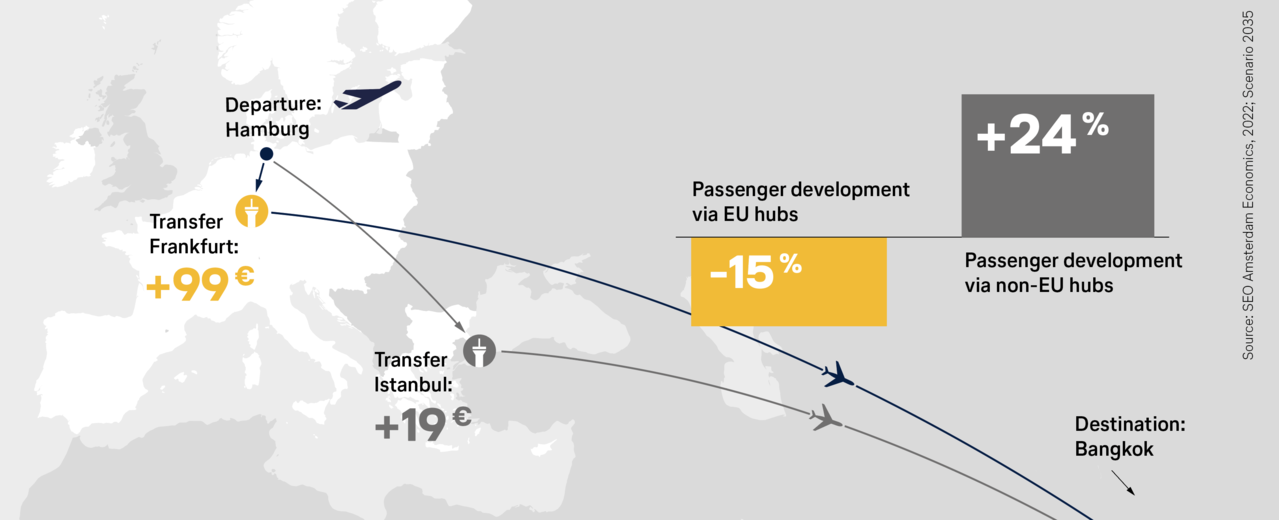
| |
| | | | Extend SAF Allowances
To reduce the costs of SAF, the EU Parliament and Council have proposed the so-called “SAF Allowances”. The idea implies that airlines would receive a certain amount of ETS certificates when refuelling with the expensive SAF. In this way, the cost disadvantage for EU airlines could be mitigated a bit. However, the necessary level playing field with airlines outside the EU is not fully achieved. Due to the sharply increasing SAF mandate after 2030 and the decreasing number of ETS allowances, this model can be a first step,
but not a permanent solution. In the long term, another, adequate compensation mechanism must be found. In the trialogue, it is now important to design the SAF Allowances in such a way that they compensate for the additional SAF costs between EU and non-EU airlines until a fundamental new regulation is in place. The success of the planned climate protection measures for air transport will be measured by whether it is still possible to catch this industrial policy boomerang. Currently, there is a danger that connectivity and value creation in Europe will be lost - in favour of companies in autocratically governed states. Europe must not become dependent on third countries for its transport policy. | |
| | | | Consumer protection in aviationOverview of refunds and compensation paymentsCapacity and staff shortages, an excessive sickness rate and a simultaneous unexpected high demand led to flight cancellations and delays across Europe and the world, this summer. This has caused a revival of the discussion on air passenger rights. However, is there a need for political action?The basis of consumer protection in European air transport is EU Regulation on air passenger rights (Regulation 261/2004). This Regulation distinguishes between the right to reimbursement on the one hand and the right to compensation on the other. 1. Reimbursement: Lufthansa ensures punctual payment of refunds
In case of denied boarding, a flight cancellation or a delay of at least five hours, passengers are offered a choice between a reimbursement of the full cost of the ticket and re-routing. Airlines are legally obliged to reimburse passengers within seven days. Despite the significant number of changes in flight schedules, Lufthansa has ensured that almost all refunds were paid within one week. For this reason, the recent calls in some member states to abolish the practice of advance payment for flight bookings are unfounded. This current practice – where consumers have to pay the full airfare at the moment of booking – is also common in other services industries. However, this is usually without such strict reimbursement deadlines. Rail transport and the event industry are only two examples. Maintain the practice of advance payment in air transport
A ban on advance payment in air transport would not be effective, since it benefits both passengers and airlines. While the airlines gain planning security to utilize capacities in an optimized economic and ecological way, customers benefit from early booking fares. These fares, which are particularly important for leisure travelers, can only be offered due to advance payment. In fact, passengers already have a choice today: if they want to avoid paying a long time in advance of their departure, they can simply book their flight at short notice. Advance payment for flight bookings has significant benefit; a ban would be counterproductive. | |
| | | | Benefits of advance payment for flight bookings 
| |
| | | | 2. Compensation: A need for political action at EU-level
Regardless of the right to reimbursement, passengers are under certain conditions also entitled to receive a compensation between 250 and 600 Euros – depending on the distance of their flight. This is applied, provided there are no “extraordinary circumstances”, such as a medical emergency or a thunderstorm. Airlines should only compensate passengers in case a particular flight irregularity was caused by a circumstance within the control of an airline. However, “extraordinary circumstances” are not defined in Regulation 261/2004. The legal base is unclear to passengers whereas airlines lack clear criteria. Long waiting times for passengers to receive compensation and court proceedings are the result of this lack of a binding, non-exhaustive list of “extraordinary circumstances”. With 175 proceedings before the Court of Justice of the European Union (CJEU), this Regulation is one of the most controversial pieces of EU-legislation. The rulings of the CJEU have questionably substituted the role of European legislators. For example, the obligation for airlines to compensate passengers in case of a strike is disproportionate and should be rejected outright. Therefore, a clear need for political action exists at EU level in order to improve legal certainty for all stakeholders involved. The introduction of a binding, non-exhaustive list clarifying “extraordinary circumstances” is a much-needed improvement. This would reduce the need for court proceedings, speed up compensation payment processes, and create a more balanced set of eligibility criteria for airlines to compensate passengers. | |
| | | | Payment deadlines and financial amounts 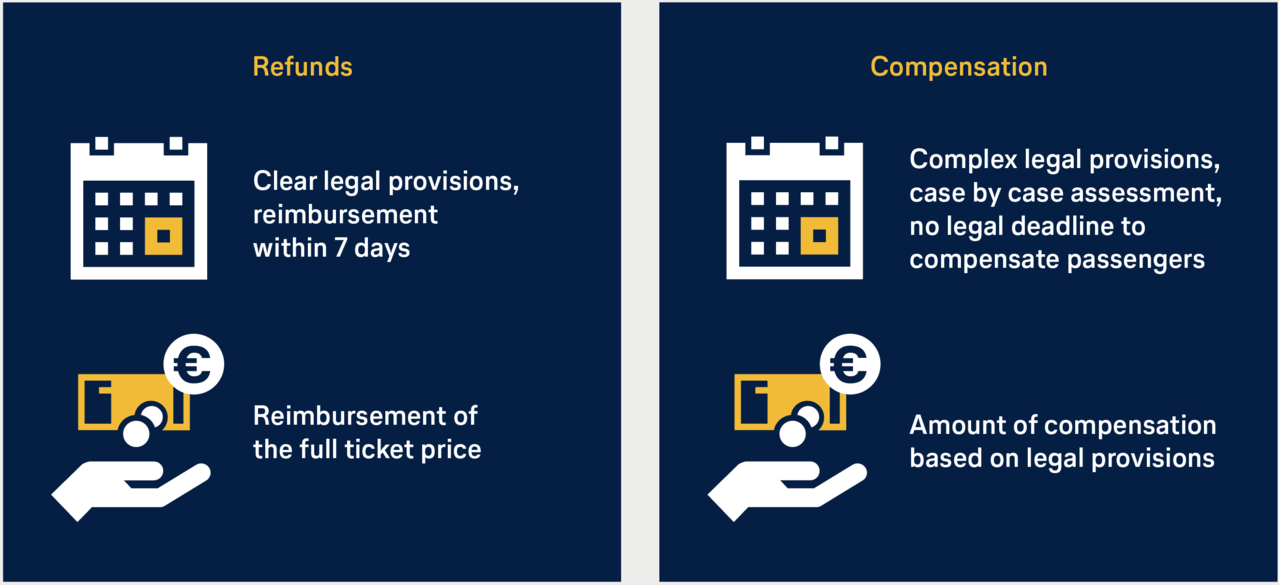
| |
| | | | 3. Automation of compensation payments: What exactly is meant?
The German coalition agreement of 2021 expresses the ambition to automate compensation payments for all transport modalities. However, when verifying the passenger’s eligibility for the right to compensation in air transport, numerous individual factors need to be assessed. The decisive factor is always the passenger’s specific travel itinerary. An example: a flight from Barcelona to Frankfurt is delayed. The final destination of one passenger is Frankfurt. This passenger might be entitled to compensation because of the delayed flight. The final destination of another passenger is Singapore and this passenger only transfers in Frankfurt. This passenger, however, still arrives on time in Singapore because of the long transfer time in Frankfurt. As a result, this passenger is not entitled to receive a compensation payment. Although both passengers were on the same flight from Barcelona to Frankfurt, both individual cases have to be treated differently. In addition, the legal base describes that only the passenger is entitled to receive a compensation payment. Quite often, however, the passenger and the person who paid the ticket are not identical – for example in the case of a business trip. Although airlines have the account details of the payer, they do not have those details of the passenger itself. This clearly shows that although the idea to automate compensation payments might sound like a good idea, it would not be feasible in practice. Nevertheless, at the same time it is clear that additional processes must be further digitalized and simplified. It is for this reason that Lufthansa works on this goal every day. As a result, we can offer our customers more and more self-service applications, such as refund requests and rebooking requests via our own app or via a chat bot. | |
| | | | Data ActEU wants to promote the use and fair exchange of industrial dataA new legislative proposal by the EU Commission “on fair access to and use of data” offers enormous opportunities for optimised flight operations, more innovation, and fewer emissions. The principle is that anyone purchasing a connected device should have access to and control over the data generated through it. The same concept is also applicable to aircraft data and is overdue. A general reference to „business secrets“ must not be used to delay or even prevent this important project. | |

| | | | According to Digital Commissioner Vestager, the fundamental plan is “to give consumers and companies even more control over what can be done with their data.” This is also an urgent need in air transport. After all, a Lufthansa aircraft generates about 2.5 terabytes of data per day through its modern sensors during operation. That corresponds to the data volume of more than 600 cinematic films. So far, however, this data has not been used by Lufthansa, but by the aircraft manufacturers. This way, the airlines are deprived of important innovation potential. The EU law now regulates, for the first time, who may use industrial data under which conditions: the manufacturer or the user? With the Data Act, the EU Commission is giving a precise answer: anyone who purchases a connected device is also entitled to know the data relevant to its use. What sounds obvious was not the case until now. Fair data access for manufacturers AND airlines
Aircraft manufacturers control the flow of data from the sensor via the aircraft to the ground. In order to obtain access to the data from the manufacturer, the airlines have to conduct laborious negotiations. As a result, aircraft manufacturers are expanding their data monopoly and offering exclusive services that are only available via their platforms. This is where the Data Act is supposed to help. For Lufthansa, this would mean in concrete terms: Access to and control over the data that its fleet generates in operation. | |
| | | | Aircraft = XXL data producers
Modern Lufthansa aircraft generate around 2.5 terabytes of data per day. This corresponds to the data volume of over 600 cinematic films. 
| |
| | | | More efficiency and innovation
Access to data – ideally in real time – enables airlines to better analyse and thus optimise the life cycle and fuel consumption of their aircraft fleets. This is important, for example, for older components to already be identified and maintained at an early stage by evaluating sensor data (i.e. predictive maintenance). Example: Engines that show unusual behaviour in relation to identical models can be cleaned, taken out of service, or maintained ahead of time. An extension to other aircraft systems would further increase the eco-efficiency of flight operations. Moreover, the Data Act is intended to simplify the sharing of data with third parties – including maintenance companies, SMEs, start-ups, and universities. This would create new business models and better competition. Both help airlines to operate more cost-effectively and sustainably. Currently, the EU Parliament and Council are discussing the legislative proposal. The upcoming decisions will set the framework for industrial data management in Europe in the coming decades. The technological and ecological innovation potentials are enormous, especially in air transport. Therefore, the Commission’s proposals should be approved and implemented quickly. | |
| | | | Creating added value through data sharing
EU Commission proposal: manufacturers and users share data 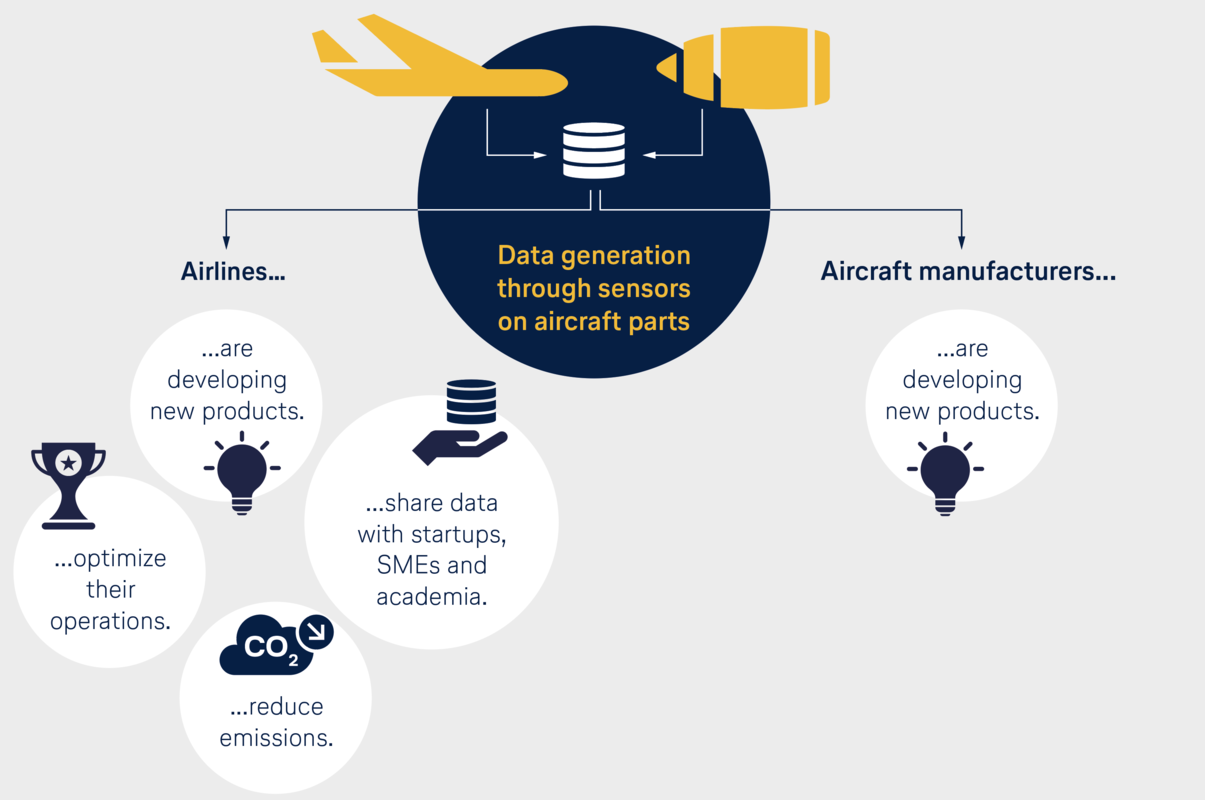
| |
| | | | The following aspects are crucial: - Airlines should be given access to and control over the data generated during their flight operations and be able to pass on their fleet data to third parties commissioned by them. This would enable fair innovation competition for more efficient and climate-friendly flight operations.
- Aircraft manufacturers are often concerned about maintaining trade secrets and the associated protection of intellectual property. The Data Act, on the other hand, refers exclusively to the data that can be recorded and utilized during operation. By analysing this operational data, neither the aircraft nor individual components can be reproduced. The arguments of the manufacturers must therefore be viewed in a differentiated manner.
| |
| | | | First European airline groupClimate targets validatedThe Lufthansa Group is the first airline group in Europe to pursue scientifically based CO2 reduction targets. | |
| | | | -50 % net CO2 emissions by 2030 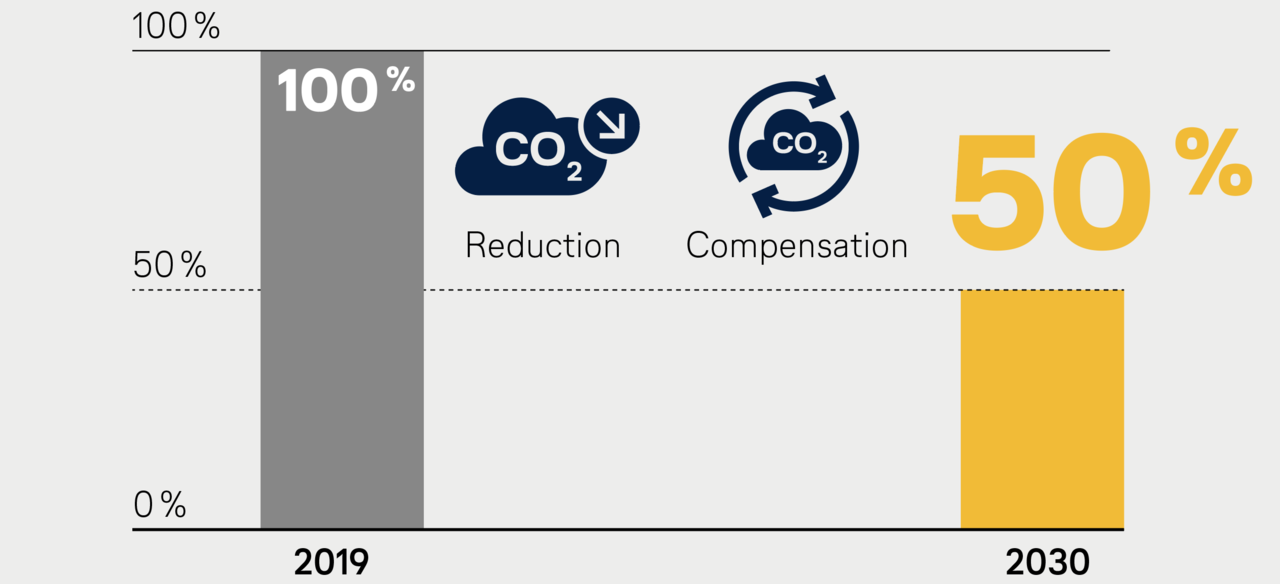
| |
| | | | In accordance with the SBTi criteria, the Lufthansa Group aims to reduce its CO2 intensity – i.e. greenhouse gas emissions per transported payload, be it passengers or freight – by 30.6 percent by 2030 compared to 2019. This corresponds to an absolute CO2 reduction of 18 percent. To complement this, the Group intends to achieve its self-imposed target of halving net CO2 emissions by 2030 through offset measures. SBTi is a collaboration between the United Nations Global Compact, the World Resources Institute (WRI), CDP and the World Wide Fund for Nature (WWF). In accordance with the SBTi criteria, the Lufthansa Group aims to reduce its CO2 intensity – i.e. greenhouse gas emissions per transported payload, be it passengers or freight – by 30.6 percent by 2030 compared to 2019. This corresponds to an absolute CO2 reduction of 18 percent. To complement this, the Group intends to achieve its self-imposed target of halving net CO2 emissions by 2030 through offset measures. SBTi is a collaboration between the United Nations Global Compact, the World Resources Institute (WRI), CDP and the World Wide Fund for Nature (WWF). | |
| | | | Global pioneerNew fare for CO2-neutral flyingThe Lufthansa Group is further expanding its CO2-neutral flying offers and has been testing so-called Green Fares in Scandinavia since the beginning of August: For flights from Norway, Sweden and Denmark with the Group airlines Lufthansa, SWISS, Austrian Airlines and Brussels Airlines, customers can buy flight tickets that already include full CO2 compensation. 80 percent of the offsetting is done through high-quality climate protection projects and 20 percent through the use of sustainable aviation fuels (SAF). The Green Fare is optionally displayed in the online booking screen – the first offer of its kind worldwide. | |
| | | | Sustainable aviation fuelMoU with ShellShell and the Lufthansa Group have signed a Memorandum of Understanding (MoU) for exploring the supply of sustainable aviation fuel (SAF) at airports across the globe. The airline group plans to purchase up to 1.8 million metric tons of SAF from Shell between 2024 and 2031. Such an agreement would be nothing less than one of the most significant commercial SAF cooperations in aviation. The Lufthansa Group is already the largest customer of SAF in Europe. | |
| | | | LUFTHANSA GROUP Your Contacts Show PDF Show PDF
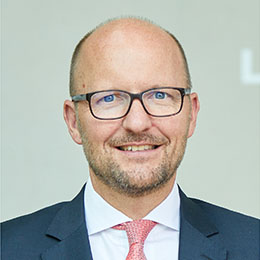
Andreas Bartels
Head of Corporate
Communications
Lufthansa Group  +49 69 696-3659 +49 69 696-3659
 andreas.bartels@dlh.de andreas.bartels@dlh.de
| 
Dr. Kay Lindemann
Head of Corporate
International Relations and
Government Affairs
Lufthansa Group  +49 30 8875-3030 +49 30 8875-3030
 kay.lindemann@dlh.de kay.lindemann@dlh.de
|

Martin Leutke
Head of Digital Communication
and Media Relations
Lufthansa Group  +49 69 696-36867 +49 69 696-36867
 martin.leutke@dlh.de martin.leutke@dlh.de
| 
Jan Körner
Head of Government Affairs
Germany and Eastern Europe
Lufthansa Group  +49 30 8875-3212 +49 30 8875-3212
 jan.koerner@dlh.de jan.koerner@dlh.de
|

Sandra Courant
Head of Political Communication
and Media Relations Berlin
Lufthansa Group  +49 30 8875-3300 +49 30 8875-3300
 sandra.courant@dlh.de sandra.courant@dlh.de
| 
Jörg Meinke
Head of EU Liaison Office
Lufthansa Group  +32 492 228141 +32 492 228141
 joerg.meinke@dlh.de joerg.meinke@dlh.de
|
| |
| | | | Published by:
Deutsche Lufthansa AG
FRA CI,
Lufthansa Aviation Center
Airportring, D-60546 Frankfurt Andreas Bartels
Head of Communications
Lufthansa Group Dr. Kay Lindemann
Head of Corporate International
Relations and Government Affairs
Lufthansa Group Martin Leutke
Head of Digital Communication
and Media Relations
Lufthansa Group | Editor in Chief:
Sandra Courant
Head of Political Communication
and Media Relations Berlin
Lufthansa Group Editorial Staff:
Annette Braun, Holger Kindler, Julia Leukel, Henning Neuhaus, Claudia Walther Press date:
5. September 2022 Agency Partners:
Köster Kommunikation
GDE | Kommunikation gestalten |
| |
|